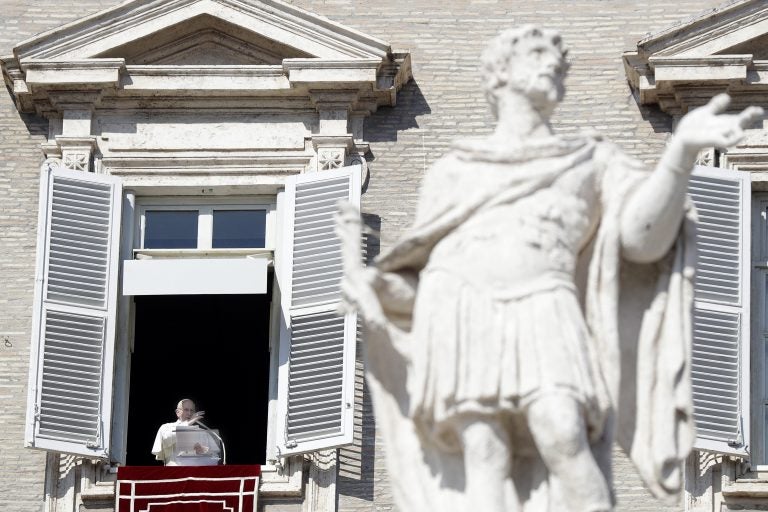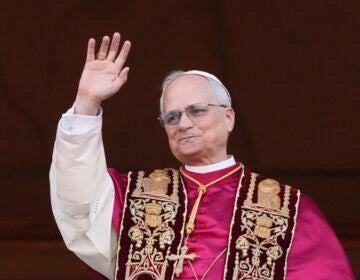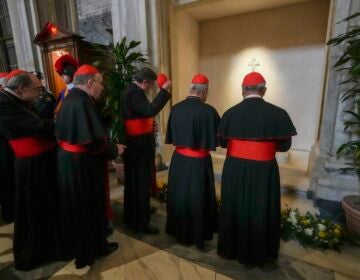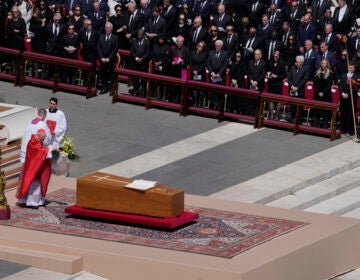Pa. survivors demand action, but fear inertia at Vatican summit on sex abuse
Representatives from Pennsylvania attending the February meeting with bishops hope to get support for extending the statute of limitations and more transparency.

Pope Francis delivers his blessing during the Angelus noon prayer In St. Peter's Square at the Vatican, Sunday, Feb. 17, 2019. (Gregorio Borgia/AP Photo)
Six months after a Pennsylvania grand jury report exposed allegations of sexual abuse by more than 300 priests, Pope Francis has called a three-day summit of church leadership starting Thursday in Rome to address the ongoing global scandal.
The goal, according to a statement released by the Vatican press office, “is that all of the bishops clearly understand what they need to do to prevent and combat the worldwide problem of the sexual abuse of minors.” Over the course of three days, more than 100 prelates will attend working groups, listening sessions and participate in “penitential liturgy.”
In Pennsylvania, the group’s actions will be watched closely — with a skeptical eye.
“I think this is a dog and pony show,” said Mike McDonnell, Philadelphia chapter leader of the Survivors Network of those Abused by Priests or SNAP. McDonnell said the delegation of Pennsylvania survivors attending the conference includes state Rep. Mark Rozzi, D-Berks.
These pilgrims carry a list of demands for church leadership. Among them are zero tolerance for priests who abuse; zero tolerance for bishops who have covered up abuse; the automatic firing of prelates who fail to report allegations to police; elimination of any requirement for priests or church hierarchy to report accusations internally first; and an end to lobbying against legislative reforms that would increase accountability.
In Pennsylvania, a bill to temporarily lift the statute of limitations on sex abuse claims — which would have allowed survivors to sue the church — failed to pass in October.
“We’re asking the bishops for a number of things. Do I think we’re going to get it? No,” McDonnell said.
Under Francis’ leadership, the church’s responses to allegations of wrongdoing have been uneven. A year ago, the pope initially rejected claims that Bishop Juan Barros Madrid of Chile shielded notorious abuser and Pinochet sympathizer Fernando Karadima, drawing criticism. Francis later for asked for forgiveness for his comments, and he went on to defrock Karadima as well as two Chilean bishops over abuse claims.
In November, the U.S. Conference of Catholic Bishops geared up to make new policy on dealing with bishops accused of sexual contact or covering up the abuse of minors when a message from the Vatican asked them to halt the reforms.
More recently, the pope defrocked Theodore McCarrick, the former cardinal and archbishop of Washington who resigned in July over credible claims he assaulted young men. That sent a signal that the church will not spare higher-ups from castigation.
Francis also abruptly acknowledged to reporters this month instances of priests sexually abusing nuns.
Juan Carlos Cruz, who survived abuse by Karadima in Chile and now lives in Philadelphia, has met with the pontiff on a few occasions. Speaking from Rome, Cruz said he believes Pope Francis wants to make a big change.
“Here, the weight is on the bishops,” he said. “There’s a lot of bishops who really don’t get it around the world.”
At the request of Archbishop Charles Scicluna, Cruz said he attended a meeting between 12 survivors and conference organizers, where he said he asked for them to collaborate more openly with the criminal justice systems in each country.
Decades of awareness that abuse was happening — and being covered up — has led many survivors to conclude that change in the Catholic Church can’t come from within.
“We see that the church fails, terribly, policing themselves,” McDonnell said.
WHYY is your source for fact-based, in-depth journalism and information. As a nonprofit organization, we rely on financial support from readers like you. Please give today.




